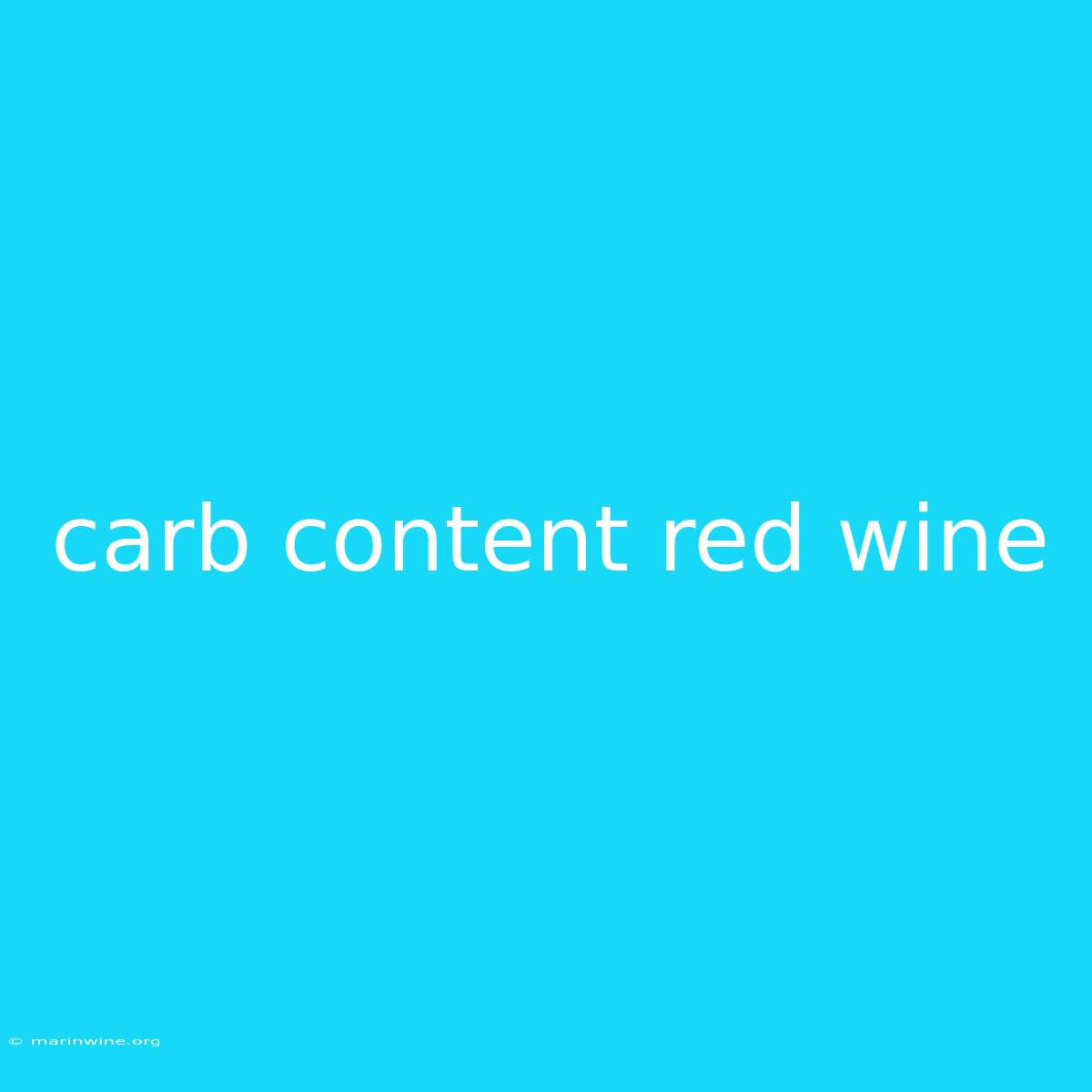Red Wine's Hidden Carb Count: Unmasking the Sweet Truth
Is red wine truly a low-carb beverage? While often touted as a healthier alternative to sugary drinks, red wine does contain carbohydrates, albeit in relatively small amounts. This article delves into the world of red wine's carb content, exploring its impact on your diet and offering insights to make informed choices.
Why It Matters: Understanding the carb content of red wine is essential for individuals following low-carb diets, managing blood sugar levels, or simply seeking healthier beverage choices.
Key Takeaways of Red Wine Carb Content:
| Takeaway | Explanation |
|---|---|
| Red wine does contain carbohydrates | Though typically low in carbs, red wine does contain a small amount, primarily from naturally occurring sugars. |
| Carb content varies by wine type and sweetness | Drier wines tend to have lower carbs than sweeter wines, as sugar is added during the winemaking process. |
| Moderation is key | While a glass of red wine may be considered "low carb" compared to other alcoholic beverages, overconsumption can lead to significant carb intake. |
Red Wine: A Closer Look
Understanding Winemaking and Sugar
Red wine is produced from fermented grape juice. During fermentation, yeast converts the grape's natural sugars into alcohol. However, not all sugars are fully converted. Some residual sugar remains, contributing to the wine's sweetness and carb content.
Dry vs. Sweet Wines
Dry wines have a lower carb content as most of the natural sugars are fermented. Sweet wines contain more residual sugar, resulting in a higher carb count.
Carb Content Variations
While there's no one-size-fits-all answer for carb content, here's a general overview:
- Dry Red Wines: Typically contain 3-5 grams of carbs per 100ml.
- Sweet Red Wines: Can contain 10-20 grams of carbs per 100ml or more.
The Impact of Red Wine on Your Diet
The carb content of red wine should be considered within the context of your overall dietary plan.
- Low-carb dieters: Moderate consumption of dry red wines can be integrated into low-carb diets.
- Blood sugar management: Individuals with diabetes or insulin resistance should be mindful of their carb intake and monitor blood sugar levels after consuming red wine.
- Weight management: Red wine's calorie content should be factored into calorie goals, as excess consumption can contribute to weight gain.
Carb Content: A Deeper Dive
Factors Influencing Carb Content
- Grape Variety: Different grape varieties have varying natural sugar levels.
- Winemaking Practices: Techniques like adding sugar or stopping fermentation early can increase carb content.
- Aging: Over time, some wines may lose sugar due to oxidation.
The Role of Alcohol in Carb Consumption
While alcohol itself does not contain carbs, its metabolism can contribute to the body's production of glucose, potentially influencing blood sugar levels.
FAQ
Q: Is red wine keto-friendly?
A: Dry red wines can be incorporated into a keto diet in moderation. However, be mindful of the carb limit in your keto plan.
Q: How can I reduce the carb content of red wine?
A: Choosing dry red wines over sweet varieties will significantly lower carb intake.
Q: Are there any red wine alternatives for low-carb diets?
A: Dry sparkling wines like Prosecco or Cava can be lower in carbs.
Q: How many glasses of red wine are considered "moderate"
A: For women, moderate consumption is one glass per day; for men, it is two glasses per day.
Tips for Red Wine Enjoyment on a Low-Carb Diet
- Choose Dry Varieties: Opt for dry red wines like Pinot Noir, Cabernet Sauvignon, or Merlot.
- Drink in Moderation: Stick to the recommended serving sizes.
- Be Mindful of Sweet Wines: Avoid sweet red wines or consume them in extremely limited quantities.
Summary of Red Wine's Carb Content
While red wine offers various health benefits, understanding its carb content is crucial for informed consumption. By making conscious choices about the type of red wine you drink and moderating your intake, you can enjoy this beverage while maintaining a healthy lifestyle.
Closing Message: Embrace the enjoyment of a glass of red wine while acknowledging its carbohydrate content, allowing you to make informed decisions that align with your dietary needs.

